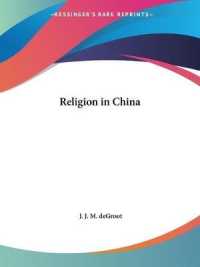- ホーム
- > 洋書
- > 英文書
- > History / World
Full Description
The partition of India in 1947 was an outstanding event in world history. It formed a major turning point in the modern history of the sub-continent and of the Commonwealth. Originally published in 1970, after more than twenty years had passed, this title brought together the evidence and put into perspective the course of events which had led to the transfer of power in India from Britain to two successor states rather than to one.
In 1937 the Muslims in India were thought to be politically weak and disorganized, yet ten years later they were able to put forward a convincing claim for a separate state. How did this come about? The lack of any sense of urgency in making a constitutional settlement between the wars, Congress miscalculations during the war, and the political exploitation of Muslim nationalism all played a part, but the interpretation of the events leading to partition tends to vary with the preconceptions and outlook of the various contributors to the debate at the time.
The enquiry which led to this volume began as a simple attempt to collect evidence from those still alive. From this grew a regular series of meetings between 'participants' and historians of the three countries, culminating in a conference. The material presented here discusses the more important aspects of the partite from the different viewpoints. It is arranged in two sections: first-hand accounts by those who took part; and an analysis by leading specialists. In his Introduction Professor Philips points to the main historical problems which had emerged and suggests areas of study which would repay early investigation.
The time was not yet ripe for a wholly definitive account, but this book suggests a framework within which this could be done and brought together raw material for future historians before the generation of eye-witnesses passed away. The resources of the School of Oriental and African Studies enabled an enterprise to be mounted which would have been beyond the capacity of any one individual.
This book is a re-issue originally published in 1970. The language used and views portrayed are a reflection of its era and no offence is meant by the Publishers to any reader by this re-publication.
Contents
Preface. Introduction. Policies and Parties 1. Some Reflections on the Transfer of Power in Plural Societies P. N. S. Mansergh 2. The Making of India's Paper Federation, 1927-35 R. J. Moore 3. British Policy and the Indian Problem, 1936-40 R. J. Moore 4. British Policy Towards the Indian States, 1940-7 E. W. R. Lumby 5. The Cabinet Mission and its Aftermath A. G. Noorani 6. The Role of Lord Mountbatten H. V. Hodson 7. Keeping the Peace in India, 1946-7: the Role of Lieut.-General Sir Francis Tuker in Eastern Command Mary Doreen Wainwright 8. Nehru, the Indian National Congress and the Partition of India, 1935-47 B. R. Nanda 9. The Congress and the Partition of India S. R. Mehrotra 10. Gandhi During Partition: a Case Study in the Nature of Satyagraha D. G. Dalton 11. Aspects of the Development of Muslim League Policy, 1937-47 Z. H. Zaidi 12. The Personality of Jinnah and his Political Strategy Khalid B. Sayeed 13. Economic Problems and Indian Independence K. N. Chaudhuri Perspectives and Reflections 14. The Background of Pakistan Mumtaz Hasan 15. Factors Leading to the Partition of British India M. A. H. Ispahani 16. A Case Study of the Social Relations Between the Muslims and the Hindus, 1935-47 I. H. Qureshi 17. Dacca University and the Pakistan Movement Mahmud Husain 18. Reflections on Some of the Causes of the Partition of the Indo-Pakistan Sub-Continent Abdul Qaiyum Khan 19. Some Memories the Raja of Mahmudabad 20. Muslim Politics, 1942-7 Humayun Kabir 21. The Partition of India in Retrospect M. Mujeeb 22. India, 1935-47 B. Shiva Rao 23. 1937-47 in Retrospect: A Civil Servant's View C. S. Venkatachar 24. A Third Force in India 1920-47: A Study in Political Analysis Percival Spear 25. Prospects for a United India after the Cessation of British Rule, as these appeared in Sind 1930-46 H. T. Lambrick 26. Federal Negotiations in India 1935-9, and After Sir Francis Wylie 27. Some Thoughts on British Policy and the Indian States, 1935-47 Sir Conrad Corfield 28. The Parliamentary Delegation to India, January 1946 Lord Sorenson 29. Impressions, 1938-47 Maurice and Taya Zinkin. Chronology, 1935-47. Select Bibliography of Works in English. Index.





